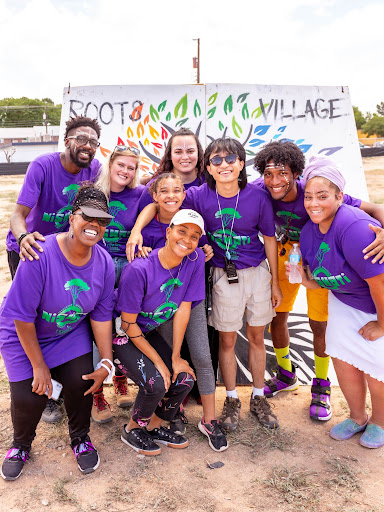Young BIPOC girls at the Roots Summer Leadership Academy
In recognition of the importance of BIPOC (Black, Indigenous, People of Color) girl’s lives in community, this article was written to showcase lessons learned in an enriching nontraditional school environment and how transformative that can be.
By Zahra Bundrage
Impacting the Lives of Young Women
Brooke Williams who is the Special Projects Assistant for the Roots Summer Leadership Academy (RSLA) points to several factors that led to the impacts that the RSLA had on young female participants. Williams describes how the young age of the instructors played into the relatability between young women and the instructors and helped to foster and grow that dynamic. Particularly, Williams states that, “The jargon that was used between them allowed for a significant bond to be formed and closed generational gaps that otherwise would have made it difficult for such lines of communication to be formed.” The music, Williams says, also created an ambiance which allowed the young women to vibe out. These factors of relatability were significantly impactful in terms of the Social Emotional Learning (SEL) that was a key component of the RSLA. Tonya Bryant, who is the Roots Conservatory Manager remarks that there was, “A greater sense of confidence and self awareness particularly with the older female students.”
Unapologetically Black and Proud
Tonya Bryant accounts for the learning loss that occurred during the year during the pandemic and says, “The students learned in this new environment without realizing that they are learning through programs such as visual arts.” Bryant discusses the level of confidence and being able to be seen as contributing to what she refers to as being, “Unapologetically Black.” Bryant also points to the notion that so often Black young women are stigmatized as being loud and having unruly hair. Bryant states, “Girls at the camp were celebrated and valued.”
Nontraditional Learning and Building Self Confidence
Researchers have noted that participation in organized activities such as mentoring and after school programs can support positive development in young girls. Williams demonstrated ways in which the RSLA fits in with the discourse researchers have put forth by stating, “Formal learning in schools was dismantled at the camp. Young girls were learning, however, it was in an nontraditional environment which allowed them to be more creative and confident.” Williams mentions that many of the young women, particularly those from single parent homes came into the camp very shy and were able to break out of their shell in this new environment. At the camp students created compliment jars with each other and the instructors. Everyone involved with the program put compliments about different elements of their character, personality and behaviors that further increased the self confidence level in each of the young women.
Community Development and Fostering ProSocial Behaviors
Bryant points to how paramount fostering a sense of community is for young BIPOC women. Bryant says, “In community you find identity and through community building you find your role. They understand their roles through defining for example, I am a daughter. I am sister.” This dynamic allows young women to understand who they are and foster a commitment to being initiated into that role while also being an established part of the community that values them and makes their role meaningful and worthy. Williams pointed to the roles young women create within the community that allows them to become leaders. Williams says, “Young women who came in unsure of their role in the community quickly became involved in community building and leadership roles.” Brooke also accounts for the physical structures such as the outdoor kibandas (hut in Swahili), the metaphorical structures, and the nontraditional learning environment which allowed for young women to truly embrace themselves and feel confident enough to flourish into active leaders.
Please visit the following links for more information:
https://nmblc.org/events/back-to-school-s-a-i-l/
Learn how to embrace and build an anti-racist, culturally responsive, and inclusive school environment that allows Black/African American children to thrive by establishing high expectations, listening and affirming their experiences and specific needs. Dr. Bannermann, Deputy Secretary of the NM Public Education Department and Amy Whitfield, Executive Director of NM State Office of African American Affairs will share opening statements leading to Dr. Kennetha L.Frye’s, PHD presentation.
http://nmblc.org/roots-summer-leadership-academy/
https://www.youtube.com/watch?v=53QN1XkhLqk&t=17s

